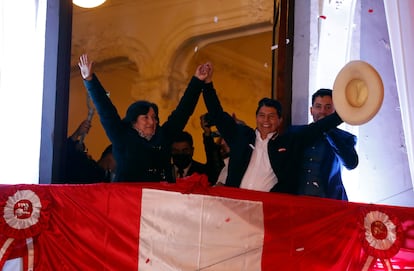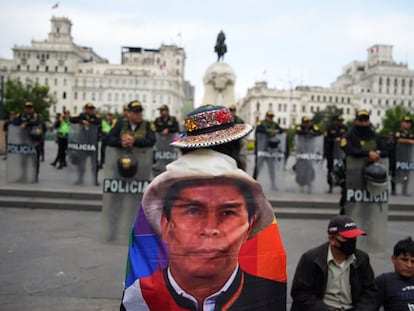Peru: A year of dual disgrace
Former president Pedro Castillo and his successor, Dina Boluarte, are products of a dysfunctional political landscape

On December 7, 2022, a series of unfortunate events unfolded in Peru. Pedro Castillo, a hapless left-wing president, and his corrupt entourage attempted the most ill-conceived coup in the nation’s history. Just hours later, Castillo found himself behind bars. Taking his place was Vice President Dina Boluarte, another political novice who shamelessly aligned herself with the far-right to secure her position. Like a villain in a gory video game, she led a government that murdered 49 Peruvians and further plunged the country into despair.
Public opinion is trying to neatly differentiate between these two episodes by flocking to the polarized camps of the Twittersphere. However, Castillo and Boluarte are cut from the same cloth. Not only because they were part of the same presidential ticket, but also because they are both products of a dysfunctional political landscape devoid of true statesmen, instead populated by transient marauders easily swayed by illicit interests. My colleague Rodrigo Barrenechea and I have labeled this the “democratic hollowing” of Peru. Contrary to the prevailing narrative, this form of democracy doesn’t perish from an authoritarian consolidation of power, but from a complete dissipation of power.
However, it is not merely a question of representational atrophy. Democratic hollowing is a democratic process, pardon the redundancy. The events of a year ago vividly revealed that democratic consensus in Peru has dissipated. While Peruvian democracy still exhibits a few, faint vital signs, the underlying principles that sustain it have withered. Peru stands as an exceptional case where democracy has endured, even though no one wants it.
After just a few weeks in power, the Castillo’s left-wing cohorts revealed their true intentions. Despite their wearisome rhetoric about empowering citizens, it became apparent that their ultimate goal was to secure jobs for themselves. Even as evidence of corruption within the Castillo government mounted, the country’s giddy sense of camaraderie swept away any concerns. They promised change, but it became clear that we were expected to ignore the pillaging of Castillo and his cronies or risk being accused of racism. The narrative was that a government for the underprivileged does not steal, but instead engages in a historically justified restorative process.
Castillo’s coup is denied by many, even though we all saw it unfold in real-time on television. Some argue that he was simply reading from a script, nothing more. Astoundingly, this view is endorsed by the presidents of Mexico and Colombia, more evidence of the democratic poverty of Latin American progressives.
Barbarism ensued. Boluarte had envisioned taming a troubled nation and relishing in her unexpected presidency. It proved an elusive goal and she resorted to violence. Peaceful protests were met with unacceptably brutal repression in this so-called democracy, and 49 people were killed. Most of the killing happened in southern Peru, where the value of Indigenous lives remains depressingly low. Shockingly, the president and her right-hand man, Alberto Otárola, doubled down on these reprehensible actions, and Otárola was even promoted from defense minister to prime minister.
In essence, the president’s hubris led her to abandon the fundamental principles of democracy, enabled by influential minority groups with plenty of resources. Take, for example, the criminal interests of our Congressional representatives. After years of conflict between the executive and legislative branches, we finally have a consensus of corruption in the Peruvian government. Despite rock-bottom approval ratings (8% for the executive branch and 6% for Congress), they are hanging on to power with a shared vision and mission of impunity. Meanwhile, the rule of law in Peru is disintegrating rapidly.
The business community has played a role in this, defecting from the democracy even before Boluarte took office. Following the 2021 elections, they supported a venal and illegal attempt by the right wing to undermine Pedro Castillo’s election victory by falsely claiming fraud. It was another failed coup attempt, similar to Castillo’s, but it happened.
Amid the current institutional and economic turmoil, Peru’s business leaders appear content. At the recent PERUMIN meeting (the nation’s biggest mining convention), the prime minister boldly declared, “We are committed to protecting essential rights and fostering social harmony.” The audience erupted in applause because they heard what they wanted to hear — the government would safeguard their interests, even if it meant shooting Peruvians in far-off corners of the country. Cheers! As historian Jorge Basadre once wrote, the Peruvian elite is known for two things — whips and dissipation.
It’s interesting how there is so much business enthusiasm for a government that has led the country into a recession. One would think that economic growth is everyone’s top priority. However, it seems that repression is more appealing than growth even though violence is bad for the GDP. Only 8% of citizens approve of the Boluarte government, but a survey shows that 71% of Peruvian business executives support it. It seems that their priority lies in forsaking the nation rather than upholding democracy.
The rule of law is eroding quickly and now we have proof, though we already knew it. The attorney general has shelved numerous criminal cases against legislators in an effort to control government institutions and manipulate democratically elected entities. And we watched as institutions tasked with investigating human rights violations were methodically declawed and dismantled.
The business community and politicians may have abandoned democracy, but what about Peruvian citizens? Well, they too are showing signs of disillusionment. A decade ago, 67% of Peruvians expressed a preference for democracy over every other form of government. Fast-forward to 2023, and that number has dropped to 50%. Furthermore, 50% favor authoritarianism or are indifferent. There is no consensus among ordinary people in Peru on how they want to be governed.
What about the Peruvians who are genuinely concerned about our democracy? Some fear the threats of this violent government because when new protests were announced, the president asked the nation a menacing question: “How many more deaths do you want?” But most of the country is just plain worn out by the litany of corruption scandals and the aimless, inept government. Who can remember yesterday’s scandal with every new outrage in the headlines? It’s an eternal déjà vu that’s almost impossible to follow yet so simple to understand. Consequently, a staggering 800,000 people left Peru between 2022 and the first half of 2023. To put this number into perspective, only 86,000 migrated elsewhere in 2020. People just want to get out of here.
Those who remain do what they can to survive. A survey conducted in September revealed that 93% of Peruvians were forced to change their diets due to economic hardship. In Latin America, Peru has the highest number of new, post-pandemic poor, and crime is on the rise. I recently asked my students what they thought about all the changes in the government (six ministers were replaced in the past year). None of them had any clue. Our youth are disengaged — it’s not rational to maintain an interest in public affairs in Peru.
But… it is rational. The longer we delay taking action to end the hijacking of our country, the harder we will have to fight and rebuild. The citizen apathy is truly disheartening to see because a few people taking to the streets could take down these predatory leaders who are as contemptible as they are unpopular. However, a transformative event remains elusive, and widespread loathing of Boluarte is not enough to galvanize collective action. Peruvians are like the woman in the Mon Laferte song: “I can still bear / Your lack of love.”
Sign up for our weekly newsletter to get more English-language news coverage from EL PAÍS USA Edition









































